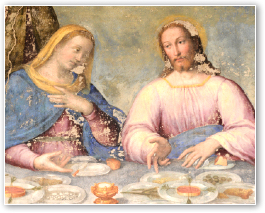Superstition and the Supernatural
- FATHER DWIGHT LONGENECKER
The reason exorcism films are popular is because it is one of the few phenomena of religious life where the invisible becomes visible, and film makers need action and something to see.
 That's why movies are called "motion pictures."
That's why movies are called "motion pictures."
Exorcism movies are popular, but when you see one what is your reaction? Will you respond with superstition or supernaturalism? Superstition is any sort of belief or behavior which is magical. A magical understanding of religion is primitive, immature and dangerous. It involves sympathetic magic or an irrational link between certain behaviors and their outcomes. It means, in some way, we are trying to manipulate things to produce an outcome that we desire.
Sympathetic magic links two otherwise unconnected things together — usually one physical and the other metaphysical and expects a causal result. So, for example, you have a black cat, and you believe that black cat symbolizes evil, so you cast a spell which you believe transfers the evil to the black cat, then you kill the black cat in order kill the evil. The form of magic which makes an irrational link between certain behaviors or objects with their outcomes is just as dangerous. So a person may believe that by walking in a circle clockwise thirteen times and throwing salt over the shoulder will ward off the evil eye. Similarly, carrying a rabbit's foot or some other talisman to bring good luck or blessing or to ward off evil is a form of magic that makes an irrational link between an object or behavior and the desired result.
The problem is, there are a good number of Christians — especially Catholics, I have to say — whose devotional practices verge on the superstitious. If a Catholic is living like the devil but wears the brown scapular because the Blessed Virgin promises that anyone who wears it will be delivered from hell, he's being superstitious. If someone thinks just because they pray this novena or go through the motions to win that indulgence (but they are not properly disposed spiritually) that it will have an automatic benefit they're being superstitious.
It is easy to think that the opposite of being superstitious is to be materialistic and dismissive of everything supernatural. Untrue. The true balance to superstition is not materialism, but supernaturalism. The truly supernatural view is based on the foundational belief that the grace of God is working in our world and through our lives. It allows for, and expects miracles. It understands that God's grace comes to us especially through the sacraments and we draw closer to him through sacramentals, but it rejects any magical interpretation, and always involves the human reason and human will in the interaction between this world and the next.
Furthermore, while there may not be watertight categories and explanations for the working of the supernatural, there are theological reasons and rational interpretations of what happens. God's working in the world always flows from and is oriented to his primary interaction — the incarnation of His son in human flesh. All supernatural works of God in the world flow from, and return to Jesus Christ — Son of God and Son of Mary.
With superstition, or what might be called magic, the practitioner is always manipulating the material world in order to manipulate the supernatural world for his own benefit.
The other distinction between the superstitious and the supernatural is the direction of the interaction. With superstition, or what might be called magic, the practitioner is always manipulating the material world in order to manipulate the supernatural world for his own benefit. The magician or shaman kills a black cat to kill the evil powers that threaten. The superstitious person wears a talisman to ward off the evil eye. The superstitious Catholics says prayers and does penance to get God to give him what we wants. The superstitious Catholics wears a scapular to escape hell — not as a sign of his constant life of prayer and faith.
Supernaturalism, on the other hand, is God's grace coming to us through the natural world. In superstition we try to impose our will. In Supernaturalism we try to conform to God's will. In superstition we do something to get our way. In supernaturalism God does something to change us to his way. This is why when we do bring our prayer requests to God we always include the prayers, "According to your will."
Finally, a word of clarification. It might sound here like I am opposed to traditional devotions, novenas, indulgences, scapulars etc. I'm not. I'm opposed to their unthinking practice, and the tendency for them to drift into superstition — the tendency to use the devotions of the Church not to conform ourselves to the Divine Will, but to get God to do what we want.
The devotions of the Church are given to us to provide the words and ways for our love of God to be expressed. They provide a method and system for our contrition, our submission to the Divine Will and a way to draw closer to Christ. They must be accompanied by true conversion of heart, genuine contrition, true devotion and an unwavering trust in God, in whom we live and move and have our Being.
 This is Meaghen Gonzalez, Editor of CERC. I hope you appreciated this piece. We curate these articles especially for believers like you.
This is Meaghen Gonzalez, Editor of CERC. I hope you appreciated this piece. We curate these articles especially for believers like you.
Please show your appreciation by making a $3 donation. CERC is entirely reader supported.

Acknowledgement
 Father Dwight Longenecker. "Superstition and the Supernatural." National Catholic Register (January 23, 2016).
Father Dwight Longenecker. "Superstition and the Supernatural." National Catholic Register (January 23, 2016).
This article is reprinted with permission from National Catholic Register.
The Author
 Father Dwight Longenecker serves as the pastor of Our Lady of the Rosary parish in Greenville, South Carolina. Father Longenecker studied for the Anglican ministry at Wycliffe Hall, Oxford and served for ten years in the Anglican ministry as a curate, a chaplain at Cambridge and a country parson. In 1995 he and his family were received into full communion with the Catholic Church. He is the author of more than twenty books including: Beheading Hydra, Praying the Rosary for Inner Healing, Listen My Son: St. Benedict for Fathers, More Christianity, Challenging Catholics: A Catholic Evangelical Dialogue, St. Benedict and St. Therese: The Little Rule & the Little Way, Mary: A Catholic-Evangelical Debate, and The Path to Rome. You can follow his writings, listen to his podcasts, join his online courses, browse his books, and be in touch at DwightLongenecker.com.
Father Dwight Longenecker serves as the pastor of Our Lady of the Rosary parish in Greenville, South Carolina. Father Longenecker studied for the Anglican ministry at Wycliffe Hall, Oxford and served for ten years in the Anglican ministry as a curate, a chaplain at Cambridge and a country parson. In 1995 he and his family were received into full communion with the Catholic Church. He is the author of more than twenty books including: Beheading Hydra, Praying the Rosary for Inner Healing, Listen My Son: St. Benedict for Fathers, More Christianity, Challenging Catholics: A Catholic Evangelical Dialogue, St. Benedict and St. Therese: The Little Rule & the Little Way, Mary: A Catholic-Evangelical Debate, and The Path to Rome. You can follow his writings, listen to his podcasts, join his online courses, browse his books, and be in touch at DwightLongenecker.com.




